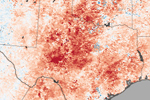The far-flung Federated States of Micronesia (FSM), located in the Pacific Ocean, has created legal history by challenging the decision to extend the life of a massive coal plant in the Czech Republic. The over 600-island nation, Micronesia, argues that greenhouse gas emissions from the Czech plant are impacting the way of life in Micronesia, many of whose islands are facing submersion under rising sea levels.
Constituting a legal landmark, in January Micronesia called for a transboundary environmental impact study (EIA) on the Prunéřov II Czech plant. While such transboundary EIAs are common for neighboring nations, this is the first time that a far away nation (and you couldn’t get much further away) has challenged this type of a project.
A paper on the legal precedent, drafted by FSM, Greenpeace and the Environmental Law Service, was presented this week at the Threatened Island Nations Climate Conference at Colombia University in New York City.
“The very real impacts of climate change are happening on our disappearing shores,” said Maketo Robert, Secretary of the Department of Justice and the Attorney General of FSM, in a press release. “This legal tool demonstrates that nations on the frontline of climate change are now supported by, and must prepare to invoke, the international law in making meaningful and more effective inputs into energy decisions.”
While the Czech Ministry of Environment still approved the coal power plant in April in spite of the transboundary EIA, they did relent, in part, by stating that Micronesia was an ‘affected state’ and requiring the CEZ Group, who runs the plant, to provide a compensation plan to offset its emissions.
Greenpeace noted in a pres release that the action “[opens] the door for climate-stricken nations to use international law to take action against major carbon emitters that pose a significant risk to their survival.”
Erosion and unprecedented tides due to rising sea levels are impacting agriculture and the very way of life in many FSM islands. Some island nations expect to be completely submerged during the century and are seeking land elsewhere to migrate to.
Long frustrated by the stalled process of cutting greenhouse gas emission through international treaties, island nations may continually turn to international law to require rapid action—or any action at all—on climate change.
Related articles
Climate change and deforestation pose risk to Amazon rainforest

(05/20/2011) Deforestation and climate change will likely decimate much of the Amazon rainforest, says a new study by Brazil’s National Institute for Space Research (INPE) and the UK’s Met Office Hadley Centre. Climate change and widespread deforestation is expected to cause warmer and drier conditions overall, reducing the resistance of the rainforest ecosystem to natural and human-caused stressors while increasing the frequency of extreme rainfall events and droughts by the end of this century. While climate models show that higher temperatures resulting from global climate change will threaten the resilience of the Amazon, current deforestation is an immediate concern to the rainforest ecosystem and is likely driving regional changes in climate.
Are US floods, fires linked to climate change?

(04/28/2011) The short answer to the question of whether or not on-going floods in the US Midwest and fires in Texas are linked to a warming Earth is: maybe. The long answer, however, is that while it is difficult—some argue impossible—for scientists to link a single extreme weather event to climate change, climate models have long shown that extreme weather events will both intensify and become more frequent as the world continues to heat up. In other words, the probability of such extreme events increases along with global average temperature.
Warmer temperatures may be exterminating pika populations one-by-one

(04/21/2011) The last decade has not been a good one for the American pika (Ochotona princeps) according to a new study in Global Change Biology. Over the past ten years extinction rates have increased by nearly five times for pika populations in the Great Basin region of the US. Examining extinctions of pike populations in the region over the past 110 years, researchers found that nearly half of the extinction events occurred since 1999.